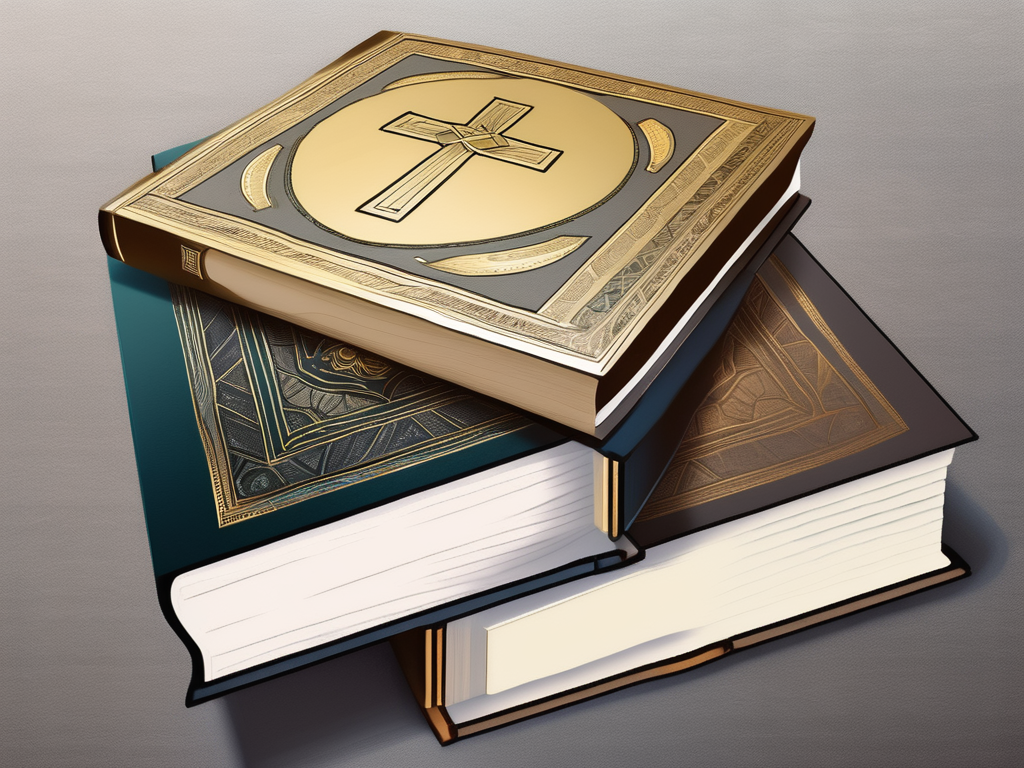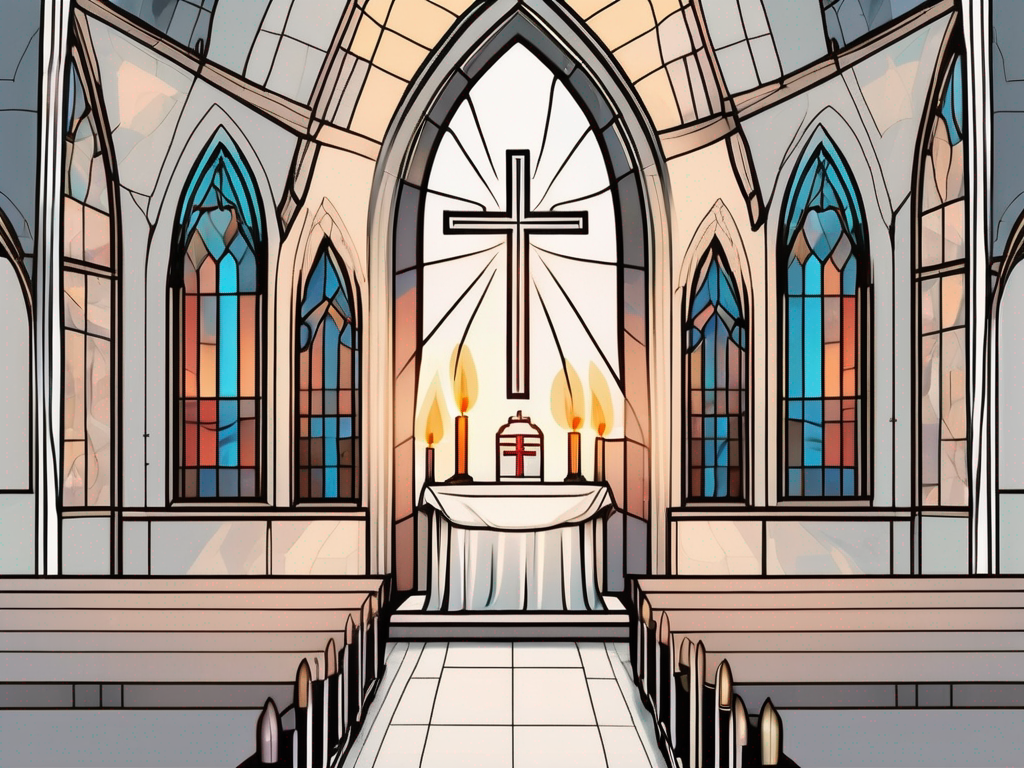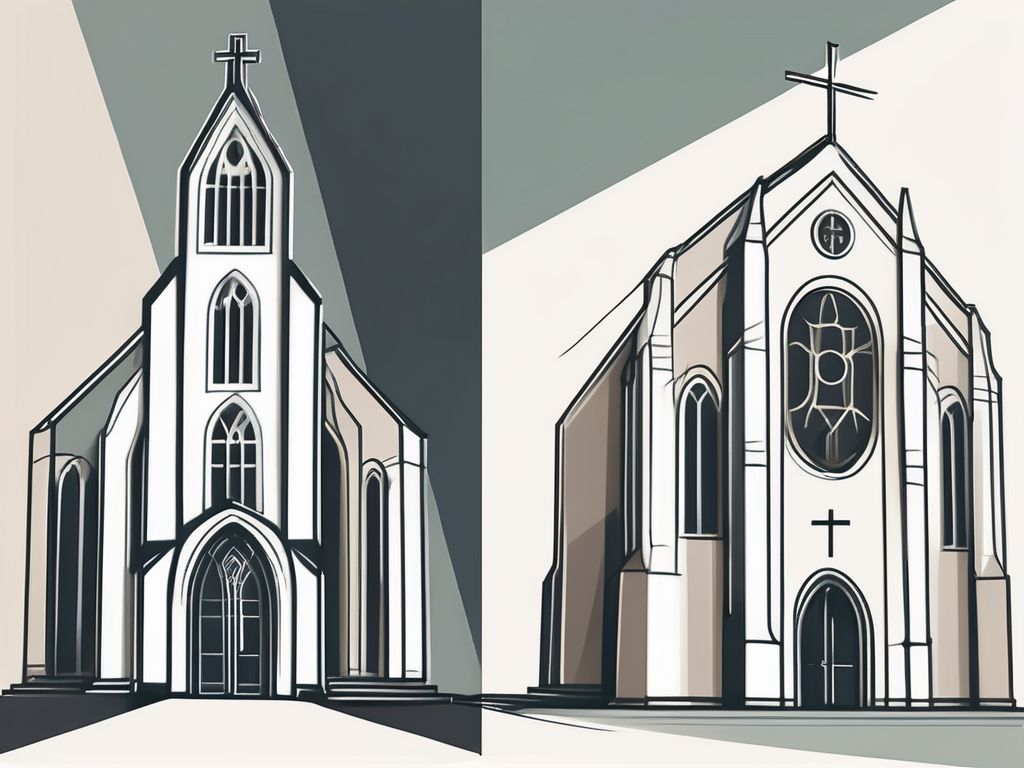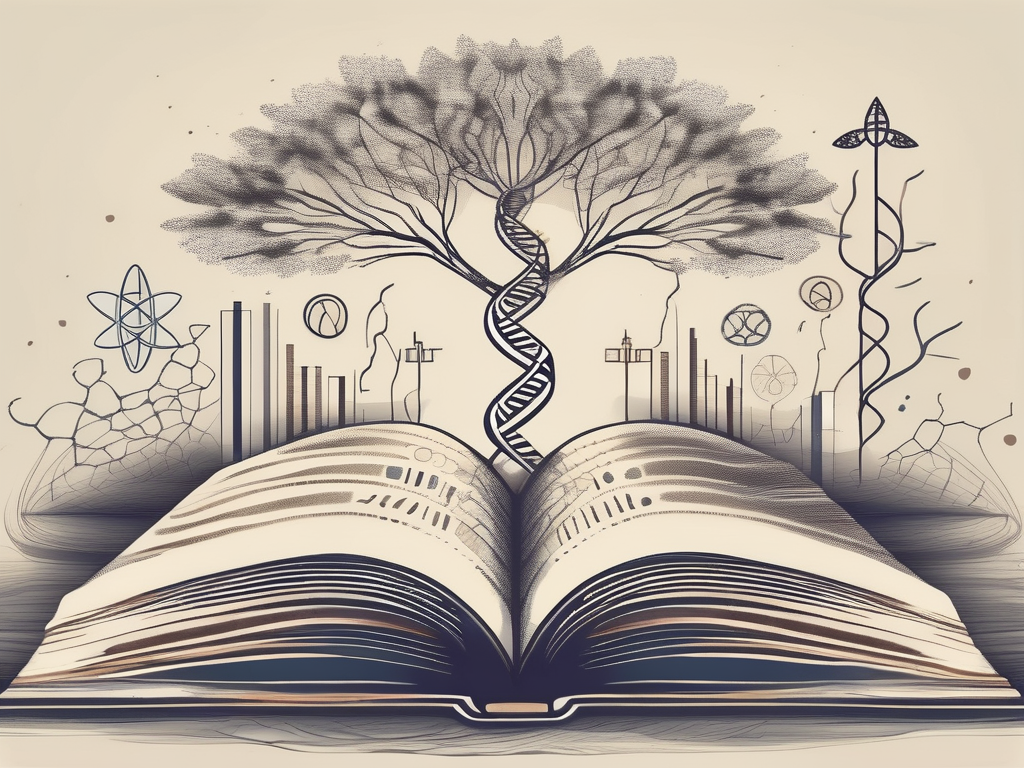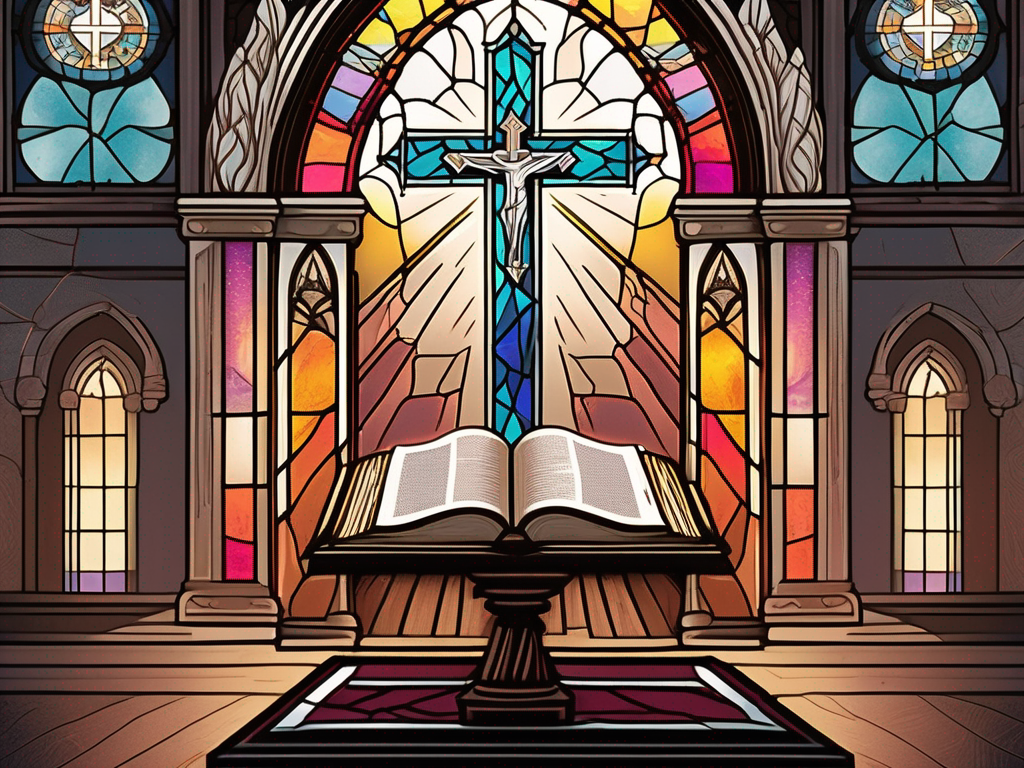There are many different versions and interpretations of the Bible in existence today. For Catholics, the Bible holds a special place in their faith and worship. But which Bible do Catholics use? In this article, we will explore the Catholic Bible, its differences from Protestant versions, its role in Catholic worship, its evolution throughout history, and the Vatican’s stance on Bible versions.
Understanding the Catholic Bible
The Catholic Bible consists of two main sections: the Old Testament and the New Testament. The Old Testament includes the sacred texts of the Hebrew Scriptures and is divided into several books, including Genesis, Exodus, Leviticus, Numbers, Deuteronomy, Joshua, Judges, Ruth, 1 Samuel, 2 Samuel, 1 Kings, 2 Kings, 1 Chronicles, 2 Chronicles, Ezra, Nehemiah, Tobit, Judith, Esther, 1 Maccabees, 2 Maccabees, Job, Psalms, Proverbs, Ecclesiastes, Song of Solomon, Wisdom, Sirach, Isaiah, Jeremiah, Lamentations, Baruch, Ezekiel, Daniel, Hosea, Joel, Amos, Obadiah, Jonah, Micah, Nahum, Habakkuk, Zephaniah, Haggai, Zechariah, and Malachi.
The New Testament contains the accounts of Jesus Christ’s life, teachings, and the early Christian community. It consists of the four Gospels (Matthew, Mark, Luke, and John), the Acts of the Apostles, the Epistles of Paul (Romans, 1 Corinthians, 2 Corinthians, Galatians, Ephesians, Philippians, Colossians, 1 Thessalonians, 2 Thessalonians, 1 Timothy, 2 Timothy, Titus, Philemon), the Epistle to the Hebrews, the Epistle of James, the First Epistle of Peter, the Second Epistle of Peter, the First Epistle of John, the Second Epistle of John, the Third Epistle of John, the Epistle of Jude, and the Book of Revelation.
The Old Testament in the Catholic Bible
In the Catholic Bible, the Old Testament includes additional books that are not found in Protestant versions. These books, known as the deuterocanonical books, are considered to be part of the canon of Scripture by Catholics. The deuterocanonical books include Tobit, Judith, Wisdom, Sirach, Baruch, and First and Second Maccabees. These books provide insight into Jewish history, wisdom, and spirituality.
Tobit tells the story of a righteous man named Tobit and his son Tobias. It explores themes of faith, trust in God, and the importance of doing good deeds. Judith recounts the story of a brave and resourceful woman who saves her people from an invading army. Wisdom, also known as the Book of Wisdom or the Wisdom of Solomon, offers philosophical and moral reflections on life, death, and the pursuit of wisdom. Sirach, also known as Ecclesiasticus, provides practical advice and teachings on various aspects of life, including family, friendship, and the pursuit of virtue.
Baruch is a book attributed to the prophet Baruch, who was a scribe and companion of the prophet Jeremiah. It contains prayers and reflections on the exile of the Jewish people and their hope for restoration. First and Second Maccabees recount the history of the Jewish revolt against the Seleucid Empire and the subsequent establishment of the Hasmonean dynasty. These books highlight the importance of religious freedom and the courage of those who stood up for their faith.
The New Testament in the Catholic Bible
The New Testament in the Catholic Bible consists of the same books as in Protestant versions. These books were written by various authors and provide a comprehensive account of the life, teachings, death, and resurrection of Jesus Christ, as well as the early development of the Christian community.
The four Gospels, Matthew, Mark, Luke, and John, present different perspectives on the life and ministry of Jesus. Matthew emphasizes Jesus’ role as the fulfillment of Old Testament prophecies and the establishment of the Kingdom of God. Mark portrays Jesus as a powerful and compassionate healer, emphasizing his actions rather than his teachings. Luke focuses on Jesus’ concern for the marginalized and his message of salvation for all people. John presents a more theological account, highlighting Jesus’ divinity and the significance of faith in him.
The Acts of the Apostles, written by Luke, provides a historical account of the early Christian community and the spread of the Gospel message. It highlights the role of the Holy Spirit in empowering the apostles and the challenges they faced in proclaiming the Good News.
The Epistles of Paul, also known as the Pauline Epistles, are a collection of letters written by the apostle Paul to various Christian communities. These letters address theological issues, provide guidance on Christian living, and offer encouragement and support to the recipients. They cover a wide range of topics, including faith, grace, salvation, the role of the Church, and the importance of love and unity among believers.
The New Testament also includes other epistles, such as the Epistle to the Hebrews, which explores the relationship between the Old and New Covenants and emphasizes the superiority of Christ’s sacrifice. The Epistle of James offers practical advice on living out one’s faith through good works. The First and Second Epistles of Peter provide encouragement and exhortation to believers facing persecution. The Epistles of John emphasize the importance of love and the need to discern false teachings. The Epistle of Jude warns against false teachers and encourages believers to remain steadfast in their faith.
The New Testament concludes with the Book of Revelation, also known as the Apocalypse. This book presents a series of visions and symbols that depict the ultimate victory of Christ over evil and the establishment of God’s kingdom. It offers hope and reassurance to believers, reminding them of God’s sovereignty and the ultimate triumph of good over evil.
Differences Between Catholic and Protestant Bibles
While the Catholic and Protestant Bibles share many of the same texts, there are some key differences between them.
The Catholic Church and Protestant denominations have different canons, or lists of books, that they consider to be part of the Bible. These differences can be traced back to the time of the Protestant Reformation in the 16th century, when Martin Luther and other reformers questioned the authority of certain books and sought to return to what they believed to be the original teachings of Christianity.
Books Exclusive to the Catholic Bible
As mentioned earlier, the Catholic Bible includes additional books known as the deuterocanonical books. These books were part of the early Christian tradition and were accepted as Scripture by the early Church. However, during the Protestant Reformation, these books were removed from the Protestant canon.
The deuterocanonical books include Tobit, Judith, Wisdom of Solomon, Sirach (Ecclesiasticus), Baruch, and First and Second Maccabees. These books provide valuable insights into the Jewish culture, beliefs, and practices during the time of Jesus and the early Christian community. They also contain stories of faith, wisdom, and historical events that are not found in the Protestant Bible.
For Catholics, the deuterocanonical books hold spiritual and historical significance. They are seen as an integral part of the Bible and are used for teaching, reflection, and prayer. These books offer a broader understanding of God’s revelation and provide a rich context for interpreting the rest of the Scriptures.
Interpretation Differences
Another difference between Catholic and Protestant Bibles lies in the approach to biblical interpretation. While both traditions value the Bible as the Word of God, Catholics rely on the teachings of the Church, the Magisterium, to provide guidance in interpreting Scripture. The Magisterium consists of the Pope and the bishops in communion with him, who are believed to have the authority to interpret and teach the true meaning of the Bible.
Protestants, on the other hand, emphasize individual interpretation and rely on personal study and reflection to understand the Bible. They believe that every believer has direct access to God’s Word and can interpret it for themselves, guided by the Holy Spirit. This emphasis on personal interpretation has led to a wide variety of interpretations within Protestantism, resulting in different theological traditions and denominations.
Despite these differences, both Catholics and Protestants share a deep reverence for the Bible and seek to live according to its teachings. The Bible is seen as a source of spiritual nourishment, moral guidance, and a means of encountering God’s presence. It continues to be a central text in the lives of millions of Christians around the world, shaping their beliefs, practices, and understanding of God’s plan for humanity.
The Role of the Bible in Catholic Worship
The Bible occupies a central role in Catholic worship and spiritual life. It is used in various ways during Mass and forms the basis for personal Bible study.
Bible Usage in Mass
In the Catholic Mass, readings from the Bible are an integral part of the liturgy. Each Mass typically includes readings from the Old Testament, the Psalms, the New Testament, and the Gospel. These readings are carefully selected to support the theme of the liturgical season or the specific feast being celebrated.
As the Mass begins, the priest processes to the altar, carrying the Book of the Gospels. This book contains the four Gospels of Matthew, Mark, Luke, and John, which are the accounts of Jesus’ life, teachings, death, and resurrection. The procession symbolizes the importance of the Word of God in the Catholic faith.
During the Mass, the priest or deacon proclaims the Word of God, and the congregation listens attentively. The Bible readings are not mere recitations, but rather, they are a living encounter with the divine. The words of Scripture are believed to be inspired by the Holy Spirit and carry the power to transform hearts and minds.
After each reading, the congregation responds, “Thanks be to God,” acknowledging the gift of God’s Word. The Bible readings are followed by a homily, where the priest offers reflections and insights on the Scripture passages to help the faithful apply God’s Word to their daily lives.
Furthermore, the Catholic Church follows a lectionary, which is a schedule of readings that ensures a systematic and comprehensive coverage of the Bible over a three-year cycle. This allows the faithful to encounter a wide range of Scripture passages and themes, helping them to develop a holistic understanding of God’s revelation.
Personal Bible Study in Catholicism
Catholics are encouraged to read and study the Bible on their own as well. Personal Bible study allows individuals to deepen their understanding of the faith and grow closer to God.
Many Catholics utilize study Bibles, which include commentaries and explanations of the Scripture passages. These resources provide valuable insights into the historical, cultural, and theological contexts of the Bible, helping readers to grasp the richness and depth of God’s Word.
Moreover, Catholic study groups and resources provide opportunities for communal study and discussion of the Bible. These groups gather to explore the Scriptures together, sharing their insights, questions, and personal experiences. This communal approach to Bible study fosters a sense of community and allows individuals to learn from one another’s perspectives.
In addition, the Catholic Church encourages the practice of lectio divina, which is a prayerful reading of the Scriptures. This ancient method involves reading a passage of Scripture slowly, meditating on its meaning, praying with the text, and contemplating its application to one’s life. Lectio divina helps Catholics to enter into a deeper relationship with God through His Word.
Furthermore, the Catholic Church has produced numerous resources to aid in personal Bible study. These include books, online platforms, and mobile applications that provide access to various translations of the Bible, commentaries, and other helpful tools. These resources enable Catholics to engage with the Bible in a meaningful and informed way.
In conclusion, the Bible holds a significant place in Catholic worship and spiritual life. Whether through its usage in the Mass or personal study, the Bible serves as a source of inspiration, guidance, and nourishment for Catholics as they seek to live out their faith in the world.
The Evolution of the Catholic Bible
The Catholic Bible has evolved throughout history, with different versions and translations being produced over time.
Early Versions of the Catholic Bible
Early versions of the Catholic Bible were written in ancient languages such as Hebrew, Aramaic, and Greek. These manuscripts were painstakingly copied by hand, and variations and errors sometimes occurred in the process.
During the fourth century, St. Jerome undertook the task of translating the Bible into Latin, resulting in the Vulgate Bible. The Vulgate became the standard Bible for the Catholic Church for centuries and played a significant role in promoting the spread of Christianity in Europe.
Modern Translations of the Catholic Bible
In modern times, the Catholic Church supports the production of accurate and accessible translations of the Bible in various languages. These translations endeavor to capture the original meaning of the Scripture while being understandable to contemporary readers.
Some well-known English translations of the Catholic Bible include the New American Bible (NAB), the Revised Standard Version, Catholic Edition (RSV-CE), and the Douay-Rheims Bible. These versions have been approved by the Church for use in liturgy and personal study.
The Vatican’s Stance on Bible Versions
The Vatican, as the central authority of the Catholic Church, holds a particular interest in the authenticity and accuracy of Bible versions.
Official Catholic Bible Translations
The Vatican has approved certain translations of the Bible as suitable for use in the liturgy and for personal study. These approved versions undergo rigorous review to ensure faithfulness to the original texts and alignment with Catholic teaching.
While different languages and regions have their specific approved translations, the Vatican remains focused on preserving the integrity and reliability of the Scripture.
The Church’s View on Other Bible Versions
The Catholic Church acknowledges the value of various Bible versions as long as they maintain fidelity to the original texts and do not contain distortions or misinterpretations.
However, the Church also emphasizes the importance of using Bible translations that have been authorized for liturgical use. This ensures that the faithful are exposed to the same text during Mass and promotes unity in worship.
In conclusion, the Bible holds a significant place in Catholic worship and spirituality. The Catholic Bible includes additional books known as the deuterocanonical books, setting it apart from Protestant versions. The Bible is used during Mass and personal study, with various translations available to the faithful. The Vatican plays an essential role in approving Bible versions to maintain accuracy and authenticity. So, which Bible do Catholics use? They use a Bible that reflects their rich tradition, teachings, and spiritual heritage.



